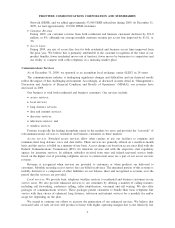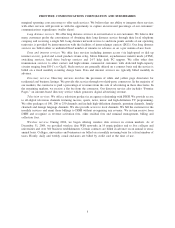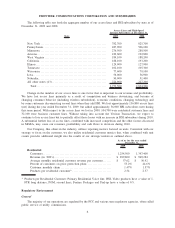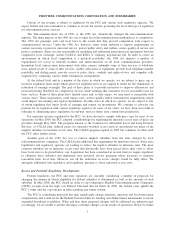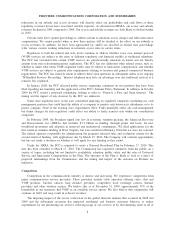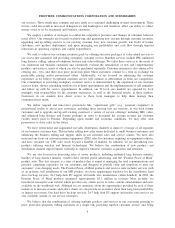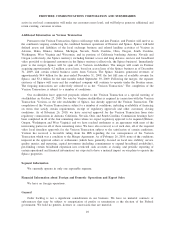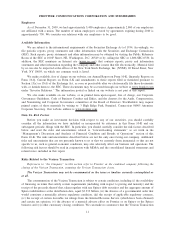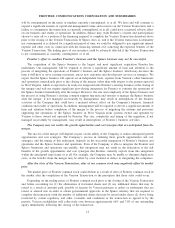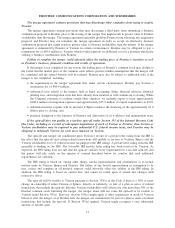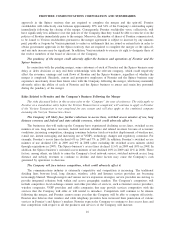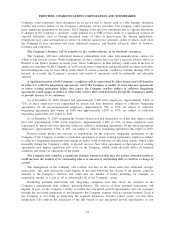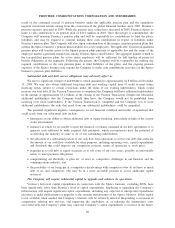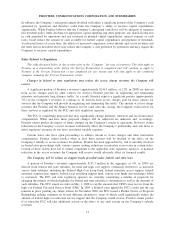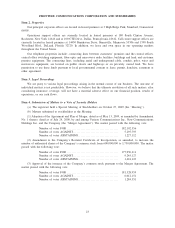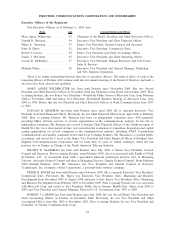Frontier Communications 2009 Annual Report Download - page 16
Download and view the complete annual report
Please find page 16 of the 2009 Frontier Communications annual report below. You can navigate through the pages in the report by either clicking on the pages listed below, or by using the keyword search tool below to find specific information within the annual report.The merger agreement contains provisions that may discourage other companies from trying to acquire
Frontier.
The merger agreement contains provisions that may discourage a third party from submitting a business
combination proposal to Frontier prior to the closing of the merger that might result in greater value to Frontier
stockholders than the merger. The merger agreement generally prohibits Frontier from soliciting any acquisition
proposal, and Frontier may not terminate the merger agreement in order to accept an alternative business
combination proposal that might result in greater value to Frontier stockholders than the merger. If the merger
agreement is terminated by Frontier or Verizon in certain circumstances, Frontier may be obligated to pay a
termination fee of $80.0 million to Verizon, which would represent an additional cost for a potential third party
seeking a business combination with Frontier.
Failure to complete the merger could adversely affect the trading price of Frontier’s securities as well
as Frontier’s business, financial condition and results of operations.
If the merger is not completed for any reason, the trading price of Frontier’s common stock may decline to
the extent that the market price of the common stock reflects positive market assumptions that the merger will
be completed and the related benefits will be realized. Frontier may also be subject to additional risks if the
merger is not completed, including:
•the requirement in the merger agreement that, under certain circumstances, Frontier pay Verizon a
termination fee of $80.0 million;
•substantial costs related to the merger, such as legal, accounting, filing, financial advisory, financial
printing fees, and integration costs that have already been incurred or will continue up to closing. While
the Company continues to evaluate certain other expenses, we currently expect to incur approximately
$100.0 million of integration expenses and approximately $75.0 million of capital expenditures in 2010;
•substantial interest expense will be incurred if Spinco initiates the financing of the approximately $3.0
billion prior to closing; and
•potential disruption to the business of Frontier and distraction of its workforce and management team.
If the spin-off does not qualify as a tax-free spin-off under Section 355 of the Internal Revenue Code
(the Code), including as a result of subsequent acquisitions of stock of Verizon or Frontier, then Verizon or
Verizon stockholders may be required to pay substantial U.S. federal income taxes, and Frontier may be
obligated to indemnify Verizon for such taxes imposed on Verizon.
The spin-off and merger are conditioned upon Verizon’s receipt of a private letter ruling from the IRS to
the effect that the spin-off and certain related transactions will qualify as tax-free to Verizon, Spinco and the
Verizon stockholders for U.S. federal income tax purposes (the IRS ruling). A private letter ruling from the IRS
generally is binding on the IRS. The favorable IRS private letter ruling has been received by Verizon. As
expected, the IRS ruling does not rule that the spin-off satisfies every requirement for a tax-free spin-off, and
the parties will rely solely on the opinion of counsel described below for comfort that such additional
requirements are satisfied.
The IRS ruling is based on, among other things, certain representations and assumptions as to factual
matters made by Verizon, Spinco and Frontier. The failure of any factual representation or assumption to be
true, correct and complete in all material respects could adversely affect the validity of the IRS ruling. In
addition, the IRS ruling is based on current law, and cannot be relied upon if current law changes with
retroactive effect.
The spin-off will be taxable to Verizon pursuant to Section 355(e) of the Code if there is a 50% or more
change in ownership of either Verizon or Spinco, directly or indirectly, as part of a plan or series of related
transactions that include the spin-off. Because Verizon stockholders will collectively own more than 50% of the
Frontier common stock following the merger, the merger alone will not cause the spin-off to be taxable to
Verizon under Section 355(e). However, Section 355(e) might apply if other acquisitions of stock of Verizon
before or after the merger, or of Frontier after the merger, are considered to be part of a plan or series of related
transactions that include the spin-off. If Section 355(e) applied, Verizon might recognize a very substantial
amount of taxable gain.
14
FRONTIER COMMUNICATIONS CORPORATION AND SUBSIDIARIES


